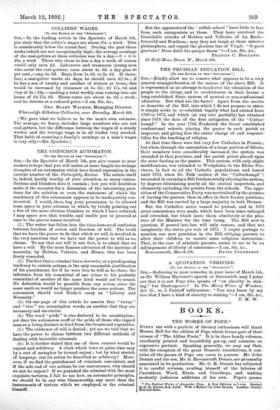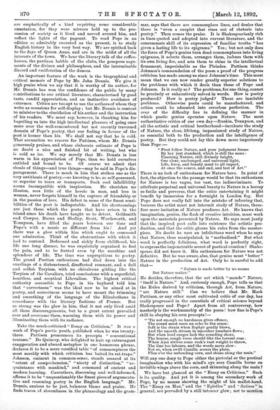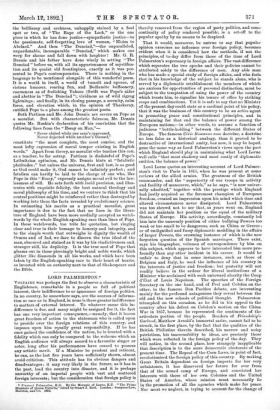BOOKS.
THE WORKS OF POPE.*
EVERY one with a particle of literary enthusiasm will thank Messrs. Bell for the edition of Pope which forms part of their reissue of "The Aldine Poets." It is in three handy volumes, excellently printed and beautifully got-up, and contains an expressive portrait. Speaking generally, we may say that, with the exception of the great Homeric translations, it con- tains all the poems of Pope one cares to possess. Mr. John Dennis and his son, Mr. G. R,avenscroft Dennis, are pleasantly associated in its production. Mr. G. R. Dennis has subjected it to careful revision, availing himself of the labours of Carruthers, Ward, Elwin, and Courthope, and making modestly judicious additions of his own. Pope's poems • The Poetical Works of Alexander Pope. A New Edition in 3 vols. Revised by G. K. Dennis, B.A. Load. With a Memoir by John Dennis. London: Georgo Bell and Sons.
are emphatically of a kind requiring some considerable annotation, for they were mirrors held up to the pro- cession of society as it lived and moved around him, and reflect the lights of the pageant. To read Pope in an edition so admirably executed as the present, is to study English history in the very beet way. We are spirited back to the days of Queen Anne, and are in the midst of all the interests of the town. We hear the literary talk of the coffee- houses, the partisan babble of the clubs, the pompous argu- ments of the divines and philosophers, and the interminable discord and vociferation of the dunces.
An important feature of the work is the biographical and critical memoir of Pope by Mr. John Dennis. We give it high praise when we say that it is worthy of its author, for Mr. Dennis has won the confidence of the public by many contributions to our critical literature, characterised by good taste, candid appreciation, and an instinctive avoidance of extremes. Critics are too apt to use the authors of whom they write as occasions for sell-display; but Mr. Dennis is content to minister to the elucidation of his author and the instruction of his readers. We must say, however, in thanking him for beguiling us into the high intellectual pleasure of going once more over the well-remembered but not recently traversed domain of Pope's poetry, that our feeling in favour of the poet is keener than his. We shall not say that he is cold. That accusation we reserve for Pattison, whom Mr. Dennis generously praises, and whose elaborate estimate of Pope is no doubt a nice and finished bit of writing, but who is cold as ice. We say merely that Mr. Dennis is less warm in his appreciation of Pope, than we hold ourselves entitled and bound to be. Of course we admit that shoals of things—and true things—may be said in Pope's dis- paragement. There is much in him that strikes one as the very antithesis of poetry,--so knowing is he, so self-possessed, so superior to tears or transports. Such cool infallibility seems incompatible with inspiration. He cherishes no illusion, sees little of the heroic in man, and less in woman, never forgets himself in the rapture of friendship or in the passion of love. His defect in some of the finest sensi- bilities of the poet is indisputable. And his shortcomings are just those which the poets that have arisen in the island since his death have taught us to detect. Goldsmith and Cowper, Burns and Shelley, Scott, Wordsworth, and 'Tennyson, have filled the years between our time and Pope's with a music so different from his ! And yet there was a glow within him which ought to command our admiration. Think of the obstructions with which it had to contend. Deformed and sickly from childhood, his life one long disease, he was exquisitely organised to feel the pain, and to be fretted even by the sunshine and splendour of life. The time was unpropitious to poetry. The grand Puritan enthusiasm had died down into the snarlings of a disheartened, disaffected remnant, and a dull and selfish Toryism, with no chivalrous gilding like the 'Toryism of the Cavaliers, tried conclusions with a superficial, heartless, and sceptical Liberalism. The highest critical authority accessible to Pope in his boyhood told him that " correctness " was the ideal now to be aimed at in poetry, and correctness seems to have meant the trimming and smoothing of the language of the Elizabethans in accordance with the literary fashions of France. But so strong was the glow in him, that it not only lived amid all these discouragements, but to a great extent prevailed over and overcame them, warming them with its power and illuminating them with its radiance.
Take the much-criticised "Essay on Criticism." It was a work of Pope's poetic youth, published when he was twenty- -three. Pattison pronounces its precepts "conventional truisms." De Quincey, who delighted to knit up extravagant exaggeration and absurd metaphor in one humorous phrase, -declares it to be a mere versified table "of commonplaces the most mouldy with which criticism has baited its rat-traps." -Johnson, eminent in common-sense, stands amazed at its "extent of comprehension," "nicety of distinction," "ac- quaintance with mankind," and command of ancient and modern learning. Carruthers, discerning and- well-informed, affirms it to be "unquestionably the finest piece of argumenta- tive and reasoning poetry in the English language." Mr. Dennis, anxious to be just, balances blame and praise. He finds traces of slovenliness in the phraseology and the gram-
mar, says that there are commonplace lines, and denies that there is "even a couplet that rises out of rhetoric into poetry." Then comes the praise. It is Shakespearianly rich in lines quoted and adopted into current literature, and the consummate skill of its expression of familiar truths "has given a lasting life to its epigrams." Yes ; but not only does the force of Pope's genius turn dead commonplaces into living epigrams, it selects them, arranges them, imbues them with its own living fire, and sets them to shine in the intellectual firmament, imperishable as the Pleiades. Pattison thinks Johnson's commendation of the poem a proof of the progress criticism has made among us since Johnson's time. This must mean that we can now render greatly superior solutions to the problems with which it deals than those of Pope and Johnson. Is it really so ? The problems, for one thing, cannot be precisely or exhaustively solved in words. How is poetry produced P How is poetry judged ? These are insoluble problems. Otherwise poets could be manufactured, and critics could be educated into errorless perfection. The crux of the difficulty lies in defining the manner in which poetic genius operates upon Nature. The most authoritative critics of our own day—Ruskin, Tennyson, and all the artistic and critical brotherhood—inculcate the study of Nature, the close, lifelong, impassioned study of Nature, as essential both to the production and the intelligence of poetry. But they could not lay this down more imperiously than Pope :— " First follow Nature, and your judgment frame By her just standard, which is still the same : Unerring Nature, still divinely bright, One clear, unchanged, and universal light, Life, force, and beauty must to all impart, At once the source, and end, and test of Art."
There is no lack of enthusiasm for Nature here. In point of fact, the objection to the passage would be that its enthusiasm for Nature is too vague, too vast, too indiscriminate. To attribute perpetual and universal beauty to Nature is a heresy so futile and perverse, that the critic entertaining it might benefit by immersion for a fortnight in London fog. But Pope does not really fall into the mistake of inferring that, because the artist must not intermit study of Nature, there- fore mere imitation of Nature produces Art. He knows that imagination, genius, the flash of creative intuition, must work upon the materials presented by Nature. He says most justly that the inspired poet calls into existence the artistic pro- duction, and that the critic gleans his rules from the master- piece. No doubt he uses an infelicitous word when he says that Nature, thus manipulated, is " methodised." But what word is perfectly felicitous, what word is perfectly right, to express the impenetrable secret of poetical creation P Shake- speare did not know it. His enthusiasm for Nature was not defective. But he was aware, also, that genius must " better " Nature in the production of Art. Only he is careful to add that-- "Nature is made better by no means But Nature makes."
He decides, therefore, that the art which " mends " Nature, "itself is Nature." And, curiously enough, Pope tells us that the Rules derived by criticism, through Art, from Nature, "are Nature still." Can we believe that Mr. Mark Pattison, or any other most cultivated critic of our day, has really progressed in the essentials of critical science beyond Shakespeare and Pope ? Apart from all controversy, how masterly is the workmanship of the poem ! how fine is Pope's skill in obeying his own precepts !— " "Pis not enough no harshness gives offence, The sound must seem an echo to the sense : Soft is the strain when Zephyr gently blows, And the smooth stream in smoother numbers flows ; But when loud surges lash the sounding shore, The hoarse, rough verse should like the torrent roar : When Ajax strives some rock's vast weight to throw, The line too labours, and the words move slow :
Not so, when swift Camilla scours the plain,
Flies o'er the unbending corn, and skims along the main."
Will any one deny to Pope either the pictorial or the poetical imagination who with his mind's eye sees Camilla borne on invisible wings above the corn, and skimming along the main P We have but glanced at the "Essay on Criticism." Such is its quality. And yet it is among the secondary work of Pope, by no means showing the might of his mallet-hand.
The "Essay on Man," and the " Epistles " and Satires" in general, are pervaded by a still intenser glow; not to mention
the brilliancy and archness, unhappily stained by a foul spot or two, of "The Rape of the Lock," or the one piece in which he has done justice—sympathetic justice—to the passionate, self-forgetting love of woman, " Eloisa to Abelard." And then "The Dunciad,"—the unparalleled, unpardonable, incomparable " Dunciad," which makes one weep for shame and fall down with laughter ! Mr. G. R. Dennis and his father have done wisely in setting "The Dunciad " before us, with all its appurtenances of mystifica- tion and its quaint old frontispiece, exactly as it was pre- sented to Pope's contemporaries. There is nothing in the language to be mentioned alongside of this wonderful poem. It is a world in itself, a world of tumult and uproar, of riotous humour, roaring fun, and Bedlamite buffoonery, coarseness as of frolicking Yahoos (Swift was Pope's aider and abettor in "The Dunciad "), vividness as of wild zigzag lightnings; and finally, in its closing passage, a serenity, calm force, and elevation which, in the opinion of Thackeray, entitled Pope to a place among the greatest poets.
Both Pattison and Mr. John Dennis are severe on Pope as a moralist. But with characteristic fairness, Mr. Dennis quotes Mr. Ruskin's declaration of his conviction that the following lines from the "Essay on Man,"— " Never elated while one man's oppressed, Never dejected while another's blessed," constitute "the most complete, the most concise, and the most lofty expression of moral temper existing in English words." Apart from theory, no moralist who teaches this can, as a teacher, be far astray. Pattison is disdainful of Pope's Leibnitzian optimism, and Mr. Dennis hints at "fatalistic platitudes ;" but unless the universe, first and last, is as good as God could make it, God cannot be infinitely perfect ; and fatalism can hardly be laid to the charge of one who, like Pope in this "Essay," expressly assigns moral evil to the law- lessness of will. He sets forth with lucid precision, and illus- trates with exquisite felicity, the best natural theology and moral philosophy of his time, and we venture to think that his central positions might be reinforced rather than destroyed by working into them the facts revealed by evolutionary science. In estimating his merits as a practical moralist, great importance is due to the fact that no lines in the litera- ture of England have been more cordially accepted as watch- words by the whole English-speaking race than lines of Pope. In those watchwords, too trite for quotation, but ringing clear and true in their homage to honesty and integrity, and to the simple worth that outweighs in dignity the wealth of Ormns and of Ind, we dare to discern the true ideal of the man, obscured and stained as it was by his vindictiveness and, stranger still, his duplicity. It is the true soul of Pope that gleams out in those piercingly bright and noble words, which glitter like diamonds in all his works, and which have been taken by the English-speaking race to their heart of hearts, as invested with an authority next to that of Shakespeare and the Bible.




































 Previous page
Previous page